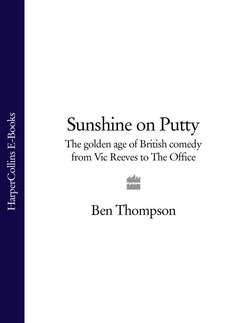Читать книгу Sunshine on Putty: The Golden Age of British Comedy from Vic Reeves to The Office - Ben Thompson, Ben Thompson - Страница 18
2 ‘Don’t Mention the War’ Conflict aftermath and comedic rebirth, from The Goons to Richard and Judy
Оглавление‘I died for the England I dreamed of, not for the England I know’
Spike Milligan, in anticipation of imminent death
under enemy fire, Italy, 1943
‘With our circuit, people at the beginning tried to separate themselves from the mainstream history of comedy, but in truth, if you go back, there have always been little clumps of young performers who appeared to be different but actually weren’t’
Alan Davies, in his manager’s West End office,
fifty years later
Vic and Bob’s first appearance on This Morning…with Richard and Judy, in the autumn of 1991, is not a huge success. After a few conversational false starts, Vic (to whom the institutional acceptance represented by the booking means a great deal) is finally getting into his stride with an impassioned discourse about his love for Dad’s Army, when Judy interrupts him with an exasperated – and characteristically curt – expostulation of ‘I can’t take any more of this’.
Both parties plainly consider this a very unsatisfactory piece of interaction – referring back to it in anxious tones on subsequent meetings – but for the watcher at home, it is actually much more fun than later, superficially more successful, encounters.
The idea that an up-and-coming Channel 4 comedian should be able to speak sincerely about his love for Captain Mainwaring and Private Pike is simply beyond Finnegan’s comprehension at this point. A couple of years later, she would probably have found it easier to grasp, but life is much more fun when she still doesn’t get it. The excitement of two different worlds colliding with (at least) one side unaware of how much they actually have in common is always far greater than a formal meeting of minds.
One ofthe distressing side-effects of British TV’s ever-increasing self-awareness in the 1990s is a steady decline in the number of arenas in which people can make a joke that everyone isn’t in on. Like school playing fields (also steadily diminishing in number), such open spaces supply a vital service to the community, and certain technical forms of virtuosity cannot be mastered without them.
What concerns us at the moment is the thing that Vic and Judy have in common. Beyond a fondness for Dad’s Army itself, it’s a shared appreciation of what the success of the show was based on, which was the folk memory of a moment (well, a six-year span of extraordinary hardship and heroism) when Britain found itself to be – in the words of J. B. Priestley – ‘the hope of all that’s best in the world’.
The Second World War was the beginning of modern British comedy. If you got a frigate every time you heard someone say that, then we’d all be admirals. But from Spike Milligan’s war memoirs to Freddie Starr doing his Hitler impression, to old-school Scouse reprobate Stan Boardman wittering on about ‘The Germans’ and their ‘Fokkers’, to Basil Fawlty’s celebrated over-reaction to the presence in his hotel of guests from the land of Beethoven and Goethe, the shadow of that great conflict certainly loomed pretty large over the seventies and eighties comedy landscape.
This was why when Martin Amis said in his book Koba The Dread that people in Britain were happy to laugh at Soviet Communism but not happy to laugh at the Nazis, it seemed as if he must have gone to bed too soon after eating a large portion of strong cheese. A recollection of that spirit of cheery defiance so touchingly embodied in the Dad’s Army theme tune, ‘Who do you think you are kidding, Mr Hitler?’,33 would persist throughout all sections of British society to the very end of the century,34 despite the best attempts of disreputable right-wing forces (from Margaret Thatcher and her Winston Churchill fetish to Fascist groups trying to collect funds by pretending they were intended for war veterans’ hospitals) to co-opt it as their own.35
Gavin Hills—journalistic avatar of that upsurge of compensatory masculinity widely termed ‘New Lad’ – described himself as being part of ‘The Airfix Generation’: ‘Boys who grew up seeing war as something distant and glorious, a playground game’. To be strictly accurate, this was not just one generation (Hills’s considerably older fellow Loaded contributor Vic Reeves recalls growing up making models from kits and painting all the uniforms in paisley colours, and in any case, the ability to see war as something distant and glorious has been a vital weapon in the armoury of recruiting sergeants from the dawn of time) but it is the legitimate province of youth to fancy its own experiences to be unique.
Anyway, Hills was so moved by those images of wartime Britain which were so prevalent (‘like the flickering shadows of a former, more honourable world’) amid the VE Day anniversary celebrations, that he decided to join the Territorial Army.36 Even without being able to consider (as they hadn’t been on TV yet) the alarming examples of Simon Pegg’s crazy friend Mike in Spaced and The Office’s notorious killing machine Gareth Keenan, this seemed a somewhat extreme reaction.
As a first step to getting to grips with the enduring legacy of the Second World War and its long lost sense of common purpose, I felt that going to see two showbiz combat-zone veterans go through their paces looked like a safer bet.
